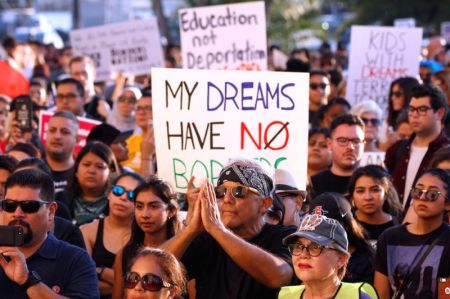Trump's Proposals for 'Dreamers' Deal Include Border Wall, Crackdown on Unaccompanied Minors

U.S. President Donald Trump, who pledged to help protect young people known as "Dreamers" brought illegally to the United States as children, called on Sunday for money to fund a border wall to be part of any immigration deal.
In a list of "principles" laid out in documents released by the White House, the Trump administration also pressed for a crackdown on unaccompanied minors who enter the United States, many of them from Central America.
The plan, which was delivered to leaders in Congress on Sunday night, drew a swift rebuke from Democrats, who are seeking a legislative fix for the Deferred Action for Childhood Arrivals (DACA) program that Trump ended last month.
"The administration can't be serious about compromise or helping the Dreamers if they begin with a list that is anathema to the Dreamers, to the immigrant community and to the vast majority of Americans," said House of Representatives Democratic leader Nancy Pelosi and Senate Democratic leader Chuck Schumer.
"The list includes the wall, which was explicitly ruled out of the negotiations. If the president was serious about protecting the Dreamers, his staff has not made a good faith effort to do so," they said in a statement.
The Trump administration wants the wish list to guide immigration reform in Congress and accompany a bill to replace DACA, the Obama-era program that protected nearly 800,000 "Dreamers" from deportation and allowed them to secure work permits.
If enacted, the White House priorities could result in the deportation of Dreamers' parents.
The proposals emphasize immigration enforcement and include a request for funds to hire 370 more immigration judges, 1,000 attorneys for the Immigration and Customs Enforcement agency, 300 federal prosecutors and 10,000 additional ICE agents to enforce immigration laws.
"These priorities are essential to mitigate the legal and economic consequences of any grant of status to DACA recipients," Trump's legislative affairs director, Marc Short, told reporters on a conference call. The White House made clear it would not be pushing for Dreamers to achieve U.S. citizenship, only legal status, in a potential deal.
Trump told Congress it had six months to come up with legislation to help Dreamers, who are a fraction of the 11 million illegal immigrants in the United States, most of whom are Hispanic.
The documents call for tighter standards for those seeking U.S. asylum, denial of federal grants to "sanctuary cities" that serve as refuges for illegal immigrants, and a requirement that employers use an electronic verification system known as "E-Verify" to keep illegal immigrants from securing jobs.
HARD LINE
Trump campaigned for president on a pledge to toughen immigration policies and build a wall along the U.S. border with Mexico. He vowed repeatedly that Mexico would pay for the wall, but began prodding Congress earlier this year to approve funding. Mexico has said it will not pay for the wall.
Trump's suggestion after a meeting with Schumer and Pelosi that wall funding would not have to be part of a DACA fix alarmed some of his supporters.
The White House sees the wall as a priority but has indicated that it could be established as part of a DACA bill or through other legislative avenues. Administration officials said that legislation that did not include all of the priorities on the list would not necessarily trigger a presidential veto.
Republicans in Congress have introduced several bills that include aspects of Trump's ideas, but many Democrats and immigration groups see the proposals as too harsh.
"The Trump administration has put forth a serious proposal to address the enforcement of our immigration laws and border security," said Republican House Judiciary Committee Chairman Bob Goodlatte in a statement. "We cannot fix the DACA problem without fixing all of the issues that led to the underlying problem of illegal immigration in the first place."
The White House's wish list targets the flow of unaccompanied minors into the United States. It would require such children to be treated the same, regardless of their countries of origin "so long as they are not victims of human trafficking and can be safely returned home or removed to safe third countries," the White House documents said.
It would expand the list of "inadmissible aliens" to include members of gangs, those who have been convicted of an aggravated felony, and former spouses and children of drug and human traffickers if they receive benefits from such behavior.
The plan also seeks to reduce the number of people who overstay their visas and reform how green cards that establish legal permanent residents are granted.
Trump's White House has so far not been able to achieve a major legislative victory, casting doubt on the potential for a breakthrough on immigration reform, which Republican and Democratic presidents have tried before without success.
Since Trump took office in January, his fellow Republicans have failed to repeal and replace former Democratic President Barack Obama's Affordable Care Act, known as Obamacare, and a White House plan for tax reform needs more support.





















